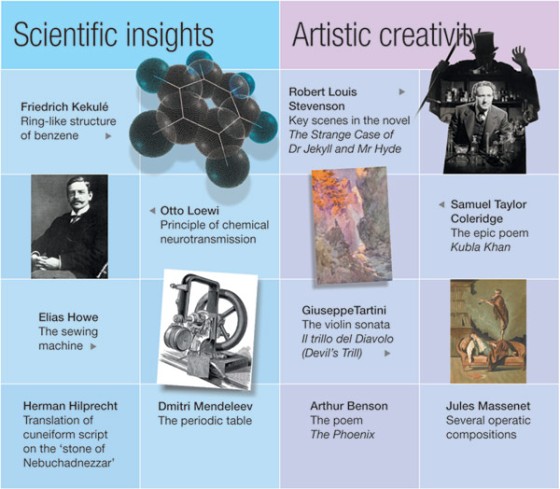Getting enough sleep is good for you in so many ways. For example, getting enough sleep is necessary to help you recover and repair muscles after your workouts. Another function of sleep may be demonstrated by the many accounts of how it has helped people to come up with some innovative and creative solutions to problems they were wrestling with, whether consciously or not.
- John Steinbeck once wrote, It is a common experience that a problem difficult at night is resolved in the morning after the committee hass worked on it
- Paul McCartney reported that as a 22-year-old in 1965, he dreamed the melody of the song Yesterday, and played it on the piano immediately on waking
- Katherine Mansfield had an unusual dream experience through the eyes of a 5 year-old boy – this became her successful short story, Sun and Moon
- Frederick Banting reportedly dreamed of a way to isolate insulin, and therefore make diabetes treatable
- When we have a problem that we need time to sort out, we say that we will sleep on it.
A conversation with Rachel on Twitter made me reflect on research that I knew about on how sleep can help to promote insight and problem solving. Insight signifies a restructuring that leads to a sudden gain of knowledge that is explicit and able to be articulated, and that leads to a change in behaviour. Sleep seems to have the effect of consolidating recent memories and could therefore allow insight by changing or shuffling their representational structures. This reconfiguration could underlie the Aha! moment that we sometimes have when we wake – the problem that we went to bed thinking about now seems to have a possible solution.
In one experiment, researchers asked participants to transform a sequence of 8 digits to a new sequence by applying two simple rules. As the participants got practice at the task, they got faster at it. However, unbeknownst to the participants, there was an additional ‘hidden’ rule which wasn’t mentioned, and was therefore processed at an implicit level of awareness. The participants seem to get this hidden rule suddenly, or develop insight into it, and this was shown by a sudden shift in moving from a sequential, iterative response to jumping to the final solution in advance. Once the participants had training on the task, the training period was followed by 8 hour intervals of either 8 hours of nocturnal sleep, 8 hours of nocturnal wakefulness or 8 hours of daytime wakefulness.
When tested again on blocks of the learning tasks those participants who had slept seemed show insight into the hidden rule at almost double the probability of the wakefulness groups. Sleep seems to facilitate insight into rules that explicitly hidden from us – we seem to be able to make the leap to solve the problem much better once we have slept. Dreams seem like they might be important in this process in that they might help to reformulate problems in ways we can’t fathom when we are awake. They may help us to reconceptualise the problems before us, the issues we are wrestling with in different ways, enabling insight.
So, the next time you are up working late on a problem, and the solution isn’t coming to you, go to bed and get some sleep. Chances are that you’re more likely to have found a way forward after having slept than staying up all night continuing to work on the problem. And your body will love you for it too.

